On Being a Woman Under ISIS's Control: "Our Worst Fears Became Reality"
Nawara was just 21 years old when Islamic State fighters claimed her hometown of Mosul and turned her life into a living nightmare.
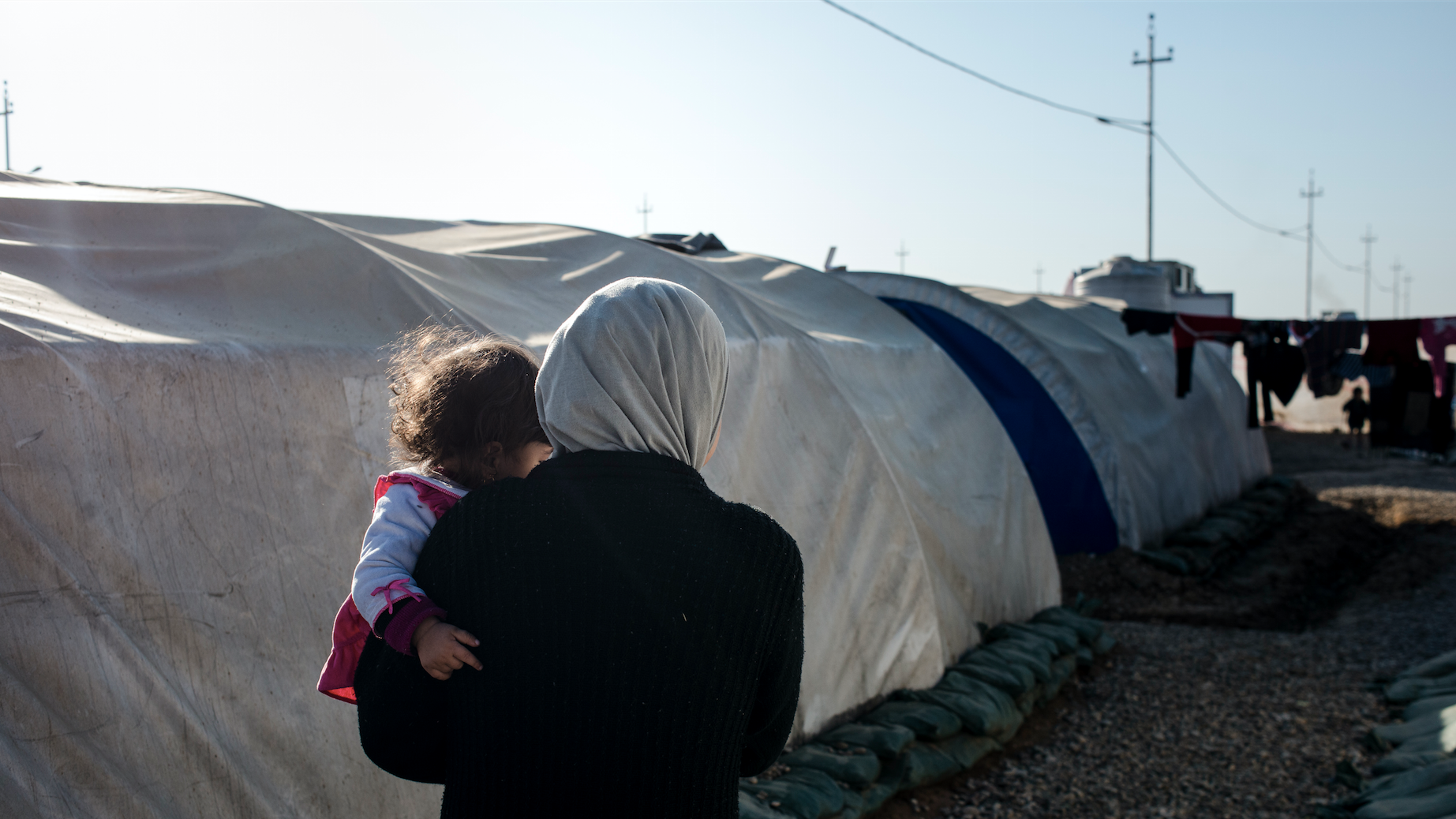
When people think of Iraq, they often think of a country mired in conflict. But for me, it was a wonderful place to grow up. Mosul used to be known as "Om Al Rabeain," the "two springs" city; it had the largest natural springs, the most luscious greenery, and the best university in the country. My family had a lovely house in the western part, with a garden full of rose bushes that overlooked the river.
Before Daesh—an Arabic acronym for the Islamic State Group, or ISIS—took my city in 2014, the only worry I had was passing my college exams. I was in my final year and desperate to be accepted at Mosul University for a degree in medicine. I studied with my best friends, Noor, Fati, and Zahra, in my parents' garden—the four of us would spend hours sitting among the citrus trees, drinking tea and imagining what the future held for us. It's painful to think about now. It feels like another life.
During the summer of 2014, my family and I sat glued to the television as news reports showed Daesh fighters coming over the border from Syria and launching an offensive on north-western Iraq. We thought of them as an unknown group who would likely be defeated by the Iraqi forces. We carried on as normal with a bit of fear—like we were on the cusp of something about to happen, but cautiously hopeful that it would come to nothing.
As Yazidi or Shia women (religions condemned under Daesh), my best friends would have been kidnapped or killed had they stayed.
In early June that year, our worst fears became reality. A phone call from my friend confirmed that Daesh had arrived in the neighborhood next to ours. "Put your books down, Nawara," she said. "They are here."
Within hours, Zahra, Fati, Noor, and their families packed up and fled to seek safety in cities outside of Mosul. The fact that my friends and I were of different faiths had never occurred to any of us before, but suddenly our lives depended on it: As Yazidi or Shia women (religions condemned under Daesh), Fati, Noor, and Zahra would have been kidnapped or killed had they stayed. We had heard of it happening in other areas. My Sunni faith, allowed under Daesh regulations, protected me from immediate harm. But it was a mixed blessing.
RELATED STORY
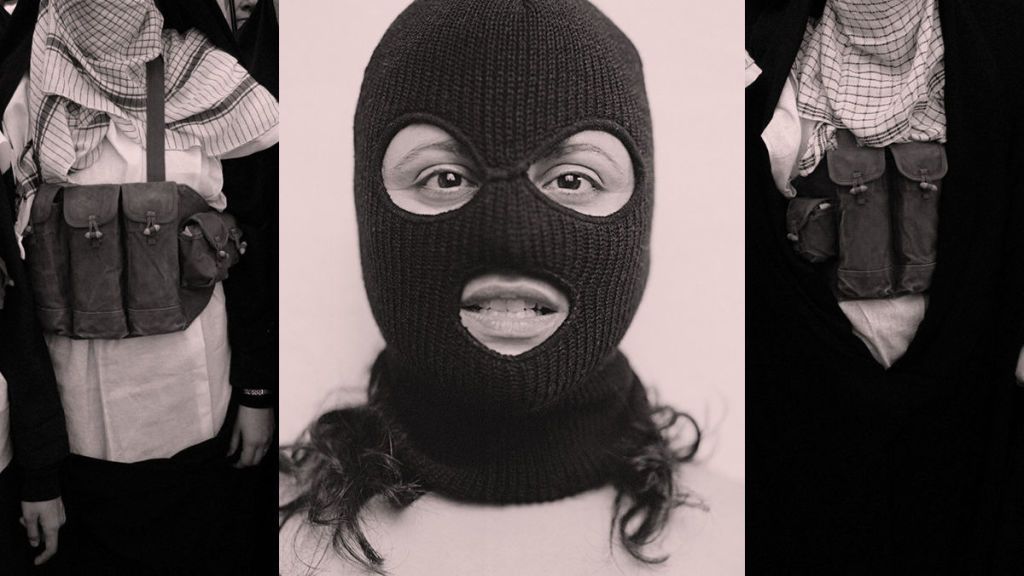
I begged my parents to leave, but my grandparents were too elderly to travel and my father was adamant that Daesh did not have a strong enough army to withstand the Iraqi forces. He reassured me that if we stayed home and kept a low profile, Daesh fighters would be defeated within a few days and life would return to normal. By the time we realized that this was not going to happen, it was too late. All routes out of Mosul had been blocked.
Over the course of six days, Daesh took huge swaths of the country in order to create a Caliphate—an Islamic State—and the Iraqi forces were unable to stop them. Their black flags went up overnight, and with them, life as I knew it was over.
Stay In The Know
Get exclusive access to fashion and beauty trends, hot-off-the-press celebrity news, and more.
Under Daesh's new extremist regime, women lived under a microscope—our every move monitored and so many rules put in place that I felt suffocated. We were forced to wear a black khimar (a full-body veil that covers the eyes) at all times and refusal to wear one gave a signal to Daesh that we were available for marriage. I had heard about how they were treating the Yazidi women in the province nearby, who had been taken to Syria as slaves, and I was terrified of the same happening to me. My sleep was riddled with nightmares of being kidnapped and raped—for me, this would have been worse than death. I decided that if this ever happened, I would kill myself.
In the early days, Zahra, Fati, and Noor called me often, asking what had happened to their homes. I would always say the same thing—that they remained untouched. I couldn't bring myself to tell them the truth, which was that Daesh had looted and taken over most of the empty buildings.
Women were forced to wear a black full-body veil that covered even our eyes at all times.
I stopped attending college. Instructors were told to either follow a curriculum based solely on Daesh teachings or leave. I knew of some girls that continued to go but they said it was like a women's prison: They were forced to study extremist ideology and said that violent messaging was part of everything. Still determined to study medicine, I taught myself at home from my textbooks. I knew if Daesh caught me, I would be in trouble for not following their strict agenda, but I wasn't willing to give up.
After a few months living under the Daesh regime, Noor called with news that there might still be a chance to take my final exam if I could make it out of Mosul. At the time, Daesh were allowing people out of the city for family emergencies only, so with the help of my father, I fabricated a story; we claimed my mother had heart disease and needed the attention of a specialist, which she would have been unable to get in Mosul. I made it to the exam but I couldn't concentrate—my parents had taken a huge risk making the journey with me and I kept thinking about what would happen if we were caught. I passed, but my score wasn't good enough to study medicine. My dream stopped there—life under Daesh had become too hard.
By October, my career aspirations were the last thing on my mind. Society was beginning to fall apart. Most people in my country work for the government in some way; as teachers, lawyers, administrators, or doctors. Under Daesh, their salaries had stopped. On top of that, food was becoming scarce because supply routes to the city had been cut. In some areas, it was impossible to buy much more than wheat flour. My family lived on savings, which were starting to run out. Many people in Mosul became desperate; they felt they had no choice but to join Daesh just so they could earn an income and feed their families. Neighbors we had known all our lives were joining and we started to fear that they were spying on us. To this day, I try to understand why they did it but I still can't forgive.
Daesh banned the use of mobile phones and would show up at private homes unexpectedly to carry out searches. Anyone found in possession of a phone was punished severely. Speaking to Fati, Zahra, and Noor became impossible—I felt cut off and alone.
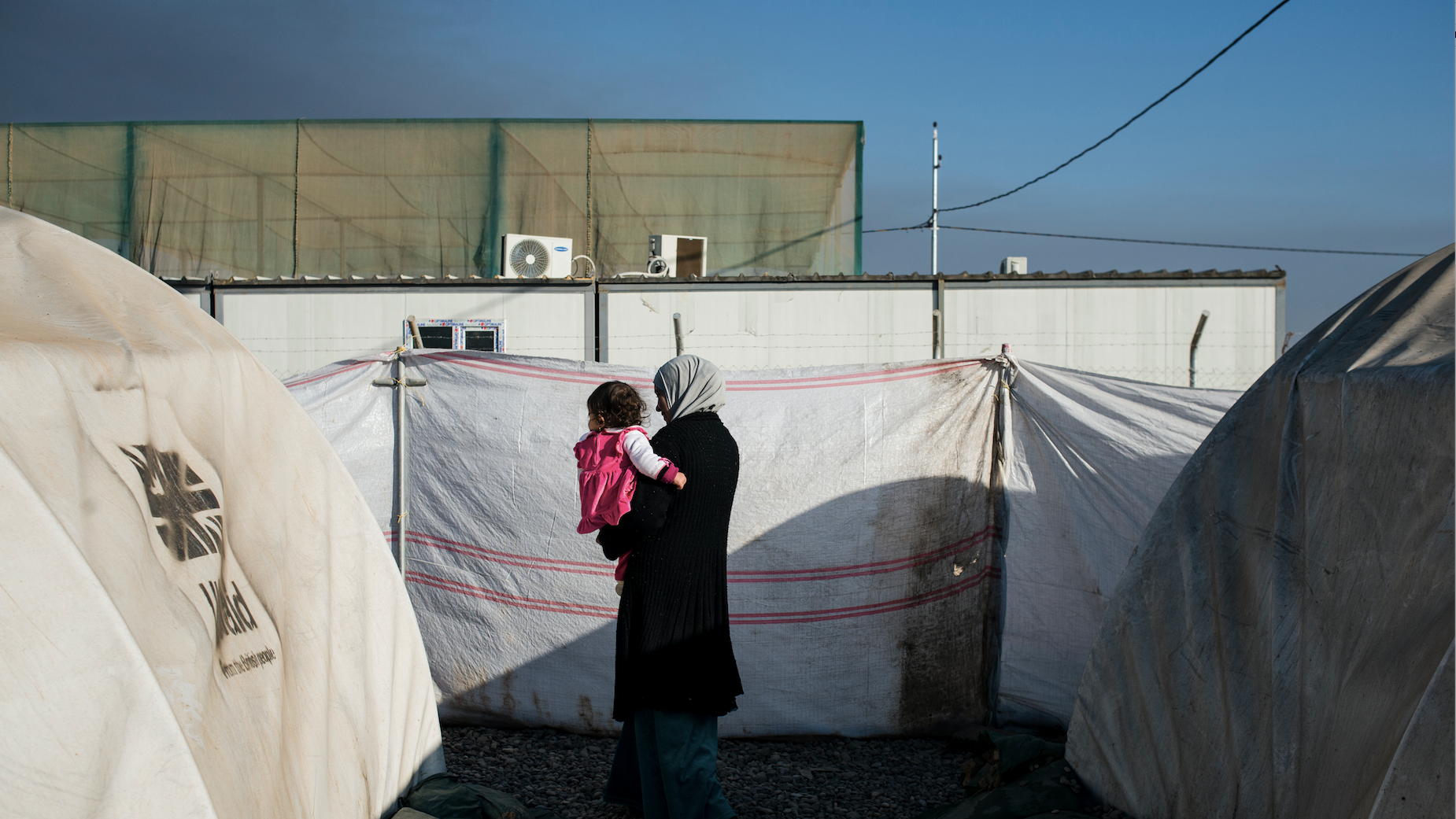
Nawara with her daughter in the internally displaced persons camp where they live. She has asked that only photos of her from behind be used, for fear of retaliation by ISIS.
The town center became unrecognizable. Big screens called "media points" went up in public places, playing propaganda all day long. The videos said Daesh were here to free us from the last regime; that anyone associated with suicide bombings against the enemy would be rewarded in heaven. Executions were carried out in public and they broadcast every single one on the big screens. We were forced to watch—even small children. In the end, my family stopped leaving the house at all.
The only thing that kept me positive was thinking about the future. I imagined that all of this was temporary and that one day, we would be able to return to the lives we once had.
I was introduced to my husband through a family member that December. Our marriage was arranged—a tradition that is very common in my country—but I was happy. Being married meant that I was protected from becoming a Daesh bride, something that was happening to many other women I knew.
Executions were carried out in public and they broadcast every single one on the big screens. We were forced to watch—even small children.
Our wedding day was a single moment of joy in an otherwise bleak time, but we weren't allowed to celebrate it. Music and dancing had been banned. I had to wear a khimar to the ceremony. When I went to court to sign the marriage contract with my husband, he couldn't even see me.
Our daughter was born eleven months later. What should have been the happiest day of my life was colored with guilt about bringing her into a world where life felt so worthless. Women and girls fleeing Daesh rule have been the victims of sexual violence, forced child marriages, and have been used as human shields.
By this time, we had moved to eastern Mosul, where my husband's family lived. I feared an upcoming conflict because I knew the only way that our city would be freed from Daesh control was if the Iraqi forces came to fight them for it.
That day came on December 12th last year, just after my daughter's first birthday. We had been living under Daesh for two years and six months. Weeks earlier, leaflets had been dropped from the sky telling us to stay in our homes, so we knew something was coming. Rockets flew overhead and the ground shook. On the third day of fighting, a mortar hit the house next door and killed our neighbor's little girl. I couldn't shake the thought that it could have been mine. We had to get out.
RELATED STORIES
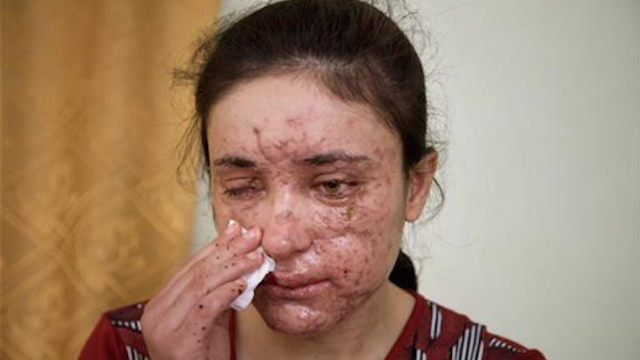
As soon as it was safe to attempt leaving, we fled to one of the camps a few hours away where tents were being provided for people escaping Mosul. The first thing I did was rip off my veil. I wanted to wear my colorful headscarves and clothing and feel like myself again. Other women around me were doing the same thing: It was our silent rebellion.
Life at the camp is hard. We share a space with thousands of other people who, like us, have nowhere else to go. More than 3 million Iraqis have been displaced by the war with Daesh. I am living in one tent with my husband, daughter, and in-laws. It is our kitchen, our bedroom, our everything. To wash, we boil water on a kerosene stove and take turns filling a bucket. We are surviving on bread, rice, and beans from the World Food Programme, as well as other supplies from NGOs—we are grateful to have shelter but it feels like half a life compared to the one we had.
I will not give up though. I am now teaching basic grammar and mathematics to children who live at the camp. They have missed nearly three years of their education under Daesh, which is something I can relate to. I'm trying to start rebuilding my life—I hope I am helping to rebuild theirs too.
The day my daugther was born should have been the happiest day of my life—but it was colored with guilt about bringing her into a world where life felt so worthless.
A person doesn't leave her home through choice. Every day I feel heartbroken that this is the only life I am able to provide for my child—but when you are forced to survive, you have to make a decision. We couldn't live every day in fear of airstrikes and bombs and even though Iraqi security forces retook Mosul in July, we have nothing left to return to. Our city is in ruins. I wouldn't wish this on anyone.
My dream is still to become a doctor. My education is the strongest weapon I have—especially as a woman here. Under Daesh, I saw how the educated women were the ones that were able to stay strong. Daesh could restrict them physically but they were never able to control their minds.
I need to go back and repeat my final exam so I can study medicine as I had planned. Right now, living here, that dream feels far away, but I believe that one day it will be possible. If not for me, then I hope for my little girl.
The World Food Programme is providing support to those affected by the conflict in Iraq. To help support those affected by conflict and hunger worldwide, make a donation at wfpusa.org.
-
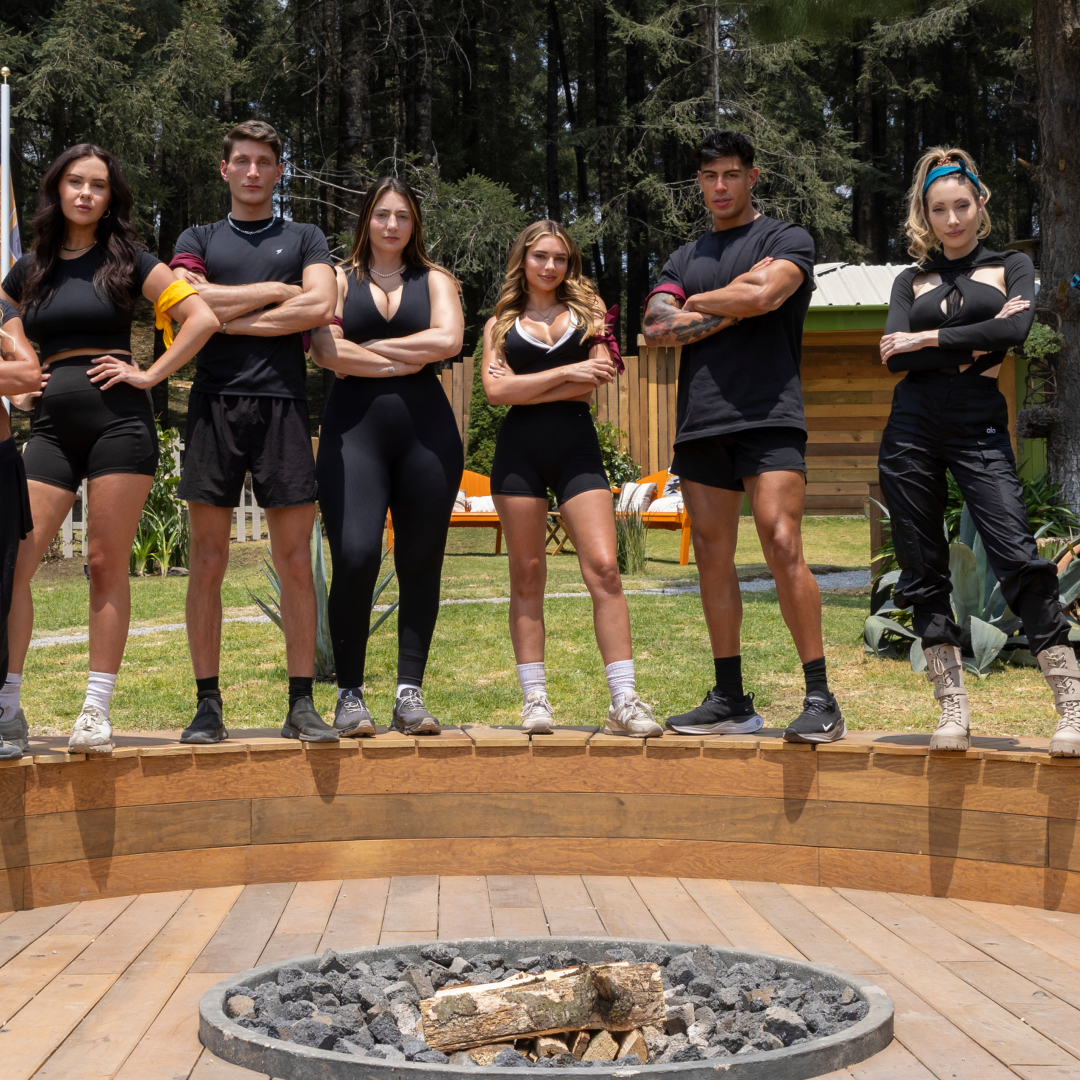 Meet the Cast of 'Battle Camp,' Netflix's New Competition Series Featuring Reality Stars From All Your Favorite Shows
Meet the Cast of 'Battle Camp,' Netflix's New Competition Series Featuring Reality Stars From All Your Favorite ShowsExpect to see stand-outs from 'Love Is Blind,' 'Too Hot to Handle,' and more hits.
By Quinci LeGardye
-
 This Royal Child Has Left Siblings Behind With Staggering 900% Popularity Jump
This Royal Child Has Left Siblings Behind With Staggering 900% Popularity JumpGoogle searches have skyrocketed for this member of the Royal Family.
By Kristin Contino
-
 Combining These Two Spring Nail Trends Was a Stroke of Genius
Combining These Two Spring Nail Trends Was a Stroke of GeniusIt’s giving futuristic fashion girl.
By Samantha Holender
-
 36 Ways Women Still Aren't Equal to Men
36 Ways Women Still Aren't Equal to MenFeatures It's just one of the many ways women still aren't equal to men.
By Brooke Knappenberger
-
 How New York's First Female Governor Plans to Fight for Women If Reelected
How New York's First Female Governor Plans to Fight for Women If ReelectedKathy Hochul twice came to power because men resigned amid sexual harassment scandals. Here, how she's leading differently.
By Emily Tisch Sussman
-
 Why the 2022 Midterm Elections Are So Critical
Why the 2022 Midterm Elections Are So CriticalAs we blaze through a highly charged midterm election season, Swing Left Executive Director Yasmin Radjy highlights rising stars who are fighting for women’s rights.
By Tanya Benedicto Klich
-
 Tammy Duckworth: 'I’m Mad as Hell' About the Lack of Federal Action on Gun Safety
Tammy Duckworth: 'I’m Mad as Hell' About the Lack of Federal Action on Gun SafetyThe Illinois Senator won't let the memory of the Highland Park shooting just fade away.
By Sen. Tammy Duckworth
-
 Roe Is Gone. We Have to Keep Fighting.
Roe Is Gone. We Have to Keep Fighting.How To Democracy always offers a path forward even when we feel thrust into the past.
By Beth Silvers and Sarah Stewart Holland, hosts of Pantsuit Politics Podcast
-
 The Supreme Court's Mississippi Abortion Rights Case: What to Know
The Supreme Court's Mississippi Abortion Rights Case: What to KnowThe case could threaten Roe v. Wade.
By Megan DiTrolio
-
 Sex Trafficking Victims Are Being Punished. A New Law Could Change That.
Sex Trafficking Victims Are Being Punished. A New Law Could Change That.Victims of sexual abuse are quietly criminalized. Sara's Law protects kids that fight back.
By Dr. Devin J. Buckley and Erin Regan
-
 My Family and I Live in Navajo Nation. We Don't Have Access to Clean Running Water
My Family and I Live in Navajo Nation. We Don't Have Access to Clean Running Water"They say that the United States is one of the wealthiest countries in the world. Why are citizens still living with no access to clean water?"
By Amanda L. As Told To Rachel Epstein